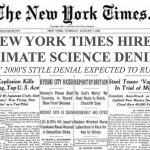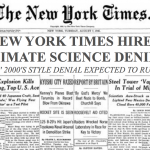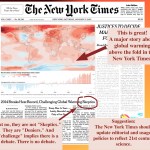New York Times
[Editor's note: Sorry this is a few hours late. I forgot to change the status from DRAFT to SCHEDULE in WordPress last night. D'oh!]
The single most persuasive strategies by which quacks sell their wares and believers in quackery persuade others to try the quackery they believe in is the personal anecdote. Indeed, I established very early on in the history of this blog a type of post that has become a staple that shows up several times a year. In these posts, I deconstruct "alternative cancer cure" testimonials, showing how the story as related doesn't provide convincing evidence that the…
Honestly, it is hard to have an honest conversation about science with science obstructors or deniers. That is how you know you are conversing with a denier. You try to have the conversation, and it gets derailed by cherry picking, misdirection, faux misunderstanding, or lies.
I don't care how far a person is from understanding a scientific concept or finding. I don't care how complex and nuanced such a finding is. As long as the science is in an area that I comfortable with as a scientist, educator, and science communicator, I'll take up the challenge of transforming scientific mumbo…
The New York Times
Elizabeth Spayed, Public Editor
Dear Elizabeth,
I am writing to express my concern for the addition of Bret Stephens to the NYT team as a columnist.
I don't expect a columnist who seemingly writes about everything to be wrong about nothing. But the Gray Lady should, at the very least, expect a columnist to know something about something.
Stephens doesn't simply express opinions that are not popular in certain, many, circles. He attempts to support his opinions with what we now seem to be calling alt-facts.
For example, his opinion about the importance of climate change is…
I've been meaning to write a letter to the New York Times I just wrote this letter to the New York Times about their very wrong decision to add a climate science denier to their editorial staff. When they were recently challenged about this idea, the response was, paraphrasing, "millions of people believe this man that climate change is not for real."
Coming from the New York Times I find that deeply disturbing and overwhelmingly offensive.
Anyway, I haven't written my letter yet, but my friend and colleague Stefan Rahmstorf, climate scientist, did, and he says it is OK to post it. So, here…
The New York Times has a history of supporting a certain degree of climate change science denial, while at the same time supporting some very good journalism in this area. Just now, the Times jumped over one big giant shark by adding Bret Stephens to its opinion page staff.
Stephens comes to the Times from the Wall Street Journal, a Murdoch anti-science rag you are all familiar with.
In 2011, he wrote,
Consider the case of global warming, another system of doomsaying prophecy and faith in things unseen.
As with religion, it is presided over by a caste of spectacularly unattractive people…
First, Michele Obama's full speech earlier today:
You know two news outlets have produced confirming evidence of actual sexual assault by Donald Trump. So, naturally, Trump intends to sue.
But, this from Media Matters:
Republican presidential nominee Donald Trump’s threats to The New York Times for reporting allegations that he committed sexual assault are legally far-fetched and provide a troubling portrait of how a Trump administration would handle the press, according to experts interviewed by Media Matters.
...
Several experts tell Media Matters his latest threats of legal action…
In January, Hillary Clinton still possessed the benefit of the doubt. Memories of her and Bill snarling at Barack Obama in 2008 had faded, and despite her long and dreadful record, it's always possible to turn over a new leaf. But Clinton's ongoing response to Bernie Sanders shows why she is unfit for the presidency. Even as the frontrunner, Hillary shows no leadership ability; she, too, follows Sanders, trailing him to the left as he takes meaningful positions on issues like income inequality and campaign finance reform. Her saccharine smile says "I can do that too!" but truly she…
To put it mildly, I'm not a big fan of Vani Hari, who has achieved Internet notoriety as a highly misguided "food activist" better known as The Food Babe. As The Food Babe, Hari has improbably become a minor celebrity by attacking food companies over various ingredients their products and, unfortunately, seems poised for more. Indeed, given how media- and social media-savvy she has become, it's not inconceivable that she could become the Dr. Oz of food. The problem with that, of course, is that what she pushes is not good information but rather misinformation. Indeed, she appears to live by…
The New York Times put the news of 2014 being the warmest year on their front page, in the precious space known as "Above The Fold." But, the venerable paper of record continues to give credence to science denialists by calling them "skeptics," and continues to imply that there really is a debate between consensus based science and politically motivated denial of science. To underscore this point I created the above graphic.
I would also like to congratulate the Washington Post for putting this piece by Joby Warrick and Chris Mooney on the front of section A1.
And, TIME has also placed…
“Simply assuming that this is an interesting controversy that we should check in on occasionally is not correct. The survival of human civilization is at risk. The news media should be making this existential crisis the No. 1 topic they cover.”
That was Vice President Al Gore being quoted in a New York Times piece by the newspaper's public editor, Margaret Sullivan. Sullivan's article, "After Changes, How Green Is The Times?" examines environmental reporting since the Times dismantled its environmental reporting facility last January. Sullivan's analysis, which seems fair, actually shows…
The only job 45-year-old Sheri Farley can hold is one where she doesn't have to sit or stand for more than 20 minutes at a time. She's racked by shooting pain in her legs and spine; doctors trace her neurological problems to five years of breathing glue fumes at the North Carolina furniture plant where she worked. New York Times reporter Ian Urbina tells the story of Farley and her co-workers in the in-depth piece "As OSHA Emphasizes Safety, Long-Term Health Risks Fester." Here's how he explains the problem with the chemical and the regulatory system that's poorly equipped to address such…
"Context is everything. Breastfeeding is almost universally beneficial in infants, but in an elderly cardiac patient, it can be fatal." - Spider Robinson
Quite a number of readers suggested I respond to James McWilliams' piece in the New York Times "The Myth of Sustainable Meat." McWilliams has garnered quite a bit of attention by critiquing the idea of local food, and in some cases, some of his analyses, as far as they go, are right. For example, McWilliams is quite right that if everyone in America eats as much beef as they always have, but converts to grassfed beef his figures are…
Ben McGrath has an excellent article on "the NFL and the concussion crisis" in the January 31st issue of the New Yorker. It's well worth a read (though it might change the way you see the Superbowl), but the thing I want to highlight is the roles of Alan Schwarz and the New York Times in raising the public's awareness of a problem that pervades football. (For our international readers, I'm referring to the US version of football - I realize that word means something different in the rest of the world.)
Specifically, the problem is the effects of repeated brain trauma, which football players…
I hope my readers will forgive me today for lapsing back into my prior profession rather than my present one as an energy and environmental writer. You see, before I gained fame and fortune writing about our ecological situation, I was a mild-mannered college teacher, whose favorite and most important job was teaching rhetoric to undergraduates.
I am perhaps odd in observing that I thought that teaching writing was the most important thing I did. Most academics believe their primary subject matter is the central portion of their work, but I came to see that the place that I had the greatest…
The New York Times has an article about the opening of a teacher-run school in The City. It sounds like an interesting experiment:
Shortly after landing at Malcolm X Shabazz High School as a Teach for America recruit, Dominique D. Lee grew disgusted with a system that produced ninth graders who could not name the seven continents or the governor of their state. He started wondering: What if I were in charge?
Three years later, Mr. Lee, at just 25, is getting a chance to find out. Today, Mr. Lee and five other teachers -- all veterans of Teach for America, a corps of college graduates who…
Let's talk about the God Particle.
It strikes me that people refer to the Higgs boson as the "God particle" in the same way some call the iPhone the "Jesus phone": with an almost pointed disregard for what such a prefix actually means. Considering the intensity of the culture wars, the popularity of the moniker is baffling. Is this about contextualizing the abstraction (and grandeur) of particle physics in a way "regular" people can understand? Does this represent a humanist concession to the religious? If so, can religious culture really be swayed by such a transparent ploy -- y'know, it…
The New York Times today has a story with the provocative title Getting Into Med School Without Hard Sciences, about a program at Mount Sinai that allows students to go to med school without taking the three things most dreaded by pre-meds: physics, organic chemistry, and the MCAT:
[I]t came as a total shock to Elizabeth Adler when she discovered, through a singer in her favorite a cappella group at Brown University, that one of the nation's top medical schools admits a small number of students every year who have skipped all three requirements.
Until then, despite being the daughter of a…
The title of John Tierney's recent column in the New York Times, "Daring to Discuss Women's Potential in Science", suggests that Tierney thinks there's something dangerous about even raising the subject:
The House of Representatives has passed what I like to think of as Larry's Law. The official title of this legislation is "Fulfilling the potential of women in academic science and engineering," but nothing did more to empower its advocates than the controversy over a speech by Lawrence H. Summers when he was president of Harvard.
This proposed law, if passed by the Senate, would require the…
You learn pretty quickly to adjust for what any mainstream media says about peak oil and anyone who does any kind of preparation. Consider the case of my friend Kathie Breault who has appeared in various newspaper and television accounts. Kathie is grandmother, a midwife and a permaculturist, and about the least "survivalist" person you can imagine. She knits stuff for her grandkids and teaches them to garden, rides her bike everywhere and is starting up a homebirth midwifery practice, helping women with little access to good health care give birth safely. And yet in an ABC Nightline…

A Times story this morning reports that, according to both documents and scientists in the US Minerals Management Service (MMS), the MMS routinely silenced safety and environmental warnings from staff in order to grant permits for even huge, high-risk drilling permits, including the BP rig that blew.
It's a good (and nauseating) story, and I'm tempted to say it's timely. Yet this story would have been a lot more timely before the rig blew, no? As I read it, I wondered why I had not read it weeks ago, when the Obama administration started proposing an expansion of drilling off US…








